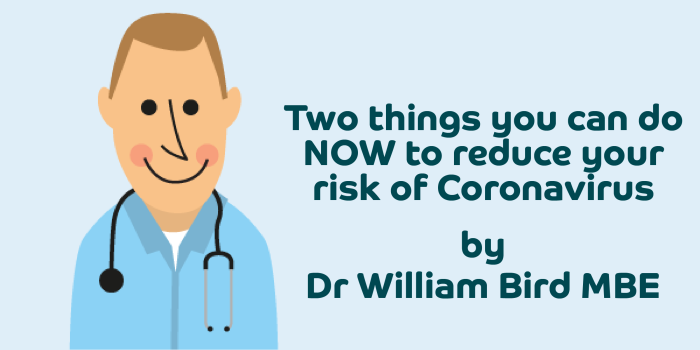Two things you can do NOW to reduce your risk of Coronavirus

Dr William Bird MBE is the creator of Beat the Street and a GP working on the NHS frontline.
Dr William Bird says:
What two things can I do to reduce my risk of becoming seriously ill with Coronavirus?
At a time when we are all worried about the risks of Coronavirus, I am getting a lot of questions from patients asking what they can do to reduce their risksof getting Coronavirus, or of experiencing a severe case of Coronavirus if they are infected.
I tell all my patients the same thing. In addition to washing hands and social distancing, there are two key things you can do today to help:
- go for a brisk walk every day for 20 - 30 minutes , and
- start to lose visceral fat from your tummy area.
To understand why, let’s take a look at what happens in your body when you’re infected with Coronavirus.
When the Coronavirus enters your body, it sets to work, invading healthy cells in the nasal passage or throat. The receptors that they force open in each cell (ACE2 receptors) are more common in the lungs, so the virus heads in that direction (as opposed to a cold that stops at the throat).
Your immune system jumps into action to try and stop these infected cells from breeding more virus. Your Natural Killer Cells destroy the infected cells by the million. This stage is called the Innate Immune Response and when this is happening, you will experience a temperature, cough, sore throat and headache.
Having as many Natural Killer Cells as possibleis vital to enable your body’s immune system to deal with the virus. Just 20 minutes brisk walk a day is enough to keep your levels of Natural Killer Cells at the optimum level. This preventative action is something we should all be doing whilst we are well. (Obviously if you are unwell it is important to rest and not undertake vigorous activity until you are on the mend, and if you have a temperature or cough you should not leave the house as per Government guidelines.)
So now, the Coronavirus has a foothold, but is being held in check while your body makes very specific antibodies that kill the virus. These antibodies take 3-5 days to make, so on day 5 of the illness, people may get more short of breath as a huge number of infected cells are destroyed in the lungs.
In some people, this massive destruction of cells is overwhelming, causing the lungs to fill with fluid and leading to sudden breathlessness. We know that people who are obese or have high blood pressure are more at risk of developing this complication. So, why is this?
Well, it appears that if your immune system is organised and well-trained, it sends a sharp attack and cleanly destroys the cells with the 'enemy' inside. This is more likely to happen if you are normal weight, have a good diet, exercise regularly and are not under too much stress.
If your immune system is like a disorganised and ill-disciplined army, then it will go a bit crazy, causing a surge of destruction not only to the infected cells but to everything around such as the lung tissue, causing more severe shortness of breath. This is called a 'cytokine storm' and evidence links visceral (tummy) fat with this poor outcome.
This is why I recommend trying to lose visceral fat – the fat that surrounds your organs in your abdomen which gives you a larger waist circumference – if you can. Luckily it is the first fat to be lost when we start eating healthily or doing more exercise. In fact, you may not even notice a change in your weight on the scales but as long as you are doing 20-30 minutes brisk walking every day you will be losing visceral fat. In scientific studies, participants who walked for 30 minutes a day for six weeks lost 20% of their visceral fat which makes a huge difference to your immune system.
And what happens next in your body’s fight with Coronavirus? Well, eventually, after 7-10 days of feeling poorly, the virus is destroyed by your body’s immune system and you are left feeling very tired after using up all that energy to fight the virus. Now, however, your immune system has a permanent memory of the virus, and next time it comes into contact with it, it will recognise it straight away and those very specific antibodies will be sent out immediately to destroy it before any symptoms start.


